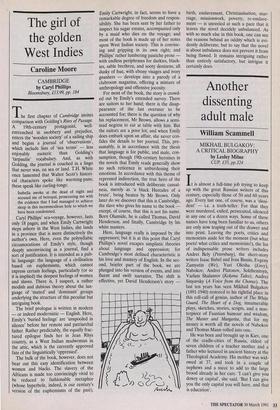The girl of the golden West Indies
Caroline Moore
CAMBRIDGE by Caryl Phillips Bloomsbury, £13.99, pp. 184 The first chapter of Cambridge invites comparison with Golding's Rites of Passage. A 19th-century protagonist, well- entrenched in snobbery and prejudice, enters the 'wooden society' of a sailing ship and begins a journal of 'observations', which include lists of 'sea terms' — less enjoyably esoteric than Golding's `tarpaulin' vocabulary. And, as with Golding, the journal is couched in a lingo that never was, on sea or land. T.H. White once lamented that Walter Scott's histori- cal characters spoke like warming-pans; these speak like curling-tongs:
Isabella awoke at the dead of night and accused me of betrayal, prosecuting me with the evidence that I had managed to achieve sleep in this incommodious hole to which we have been condemned.
Caryl Phillips' sea-voyage, however, lasts only 18 pages; and when Emily Cartwright steps ashore in the West Indies, she lands in a province that is more distinctively the author's own. Here, even the polysyllabic circumocutions of Emily's style, though deeply unconvincing as a journal, find a sort of justification. It is intended as a pub- lic language: the language of a civilisation based on euphemisms, which cannot express certain feelings, particularly (or so it is implied) the deepest feelings of women and slaves. There is, I suspect, a rather modish and dubious theory about the lan- guage of 'muted' and 'dominant' groups underlying the structure of this peculiar but intriguing book.
The brief prologue is written in modern — or indeed modernistic — English. Here, Emily's 'buried feelings' are 'unspooled in silence' before her remote and patriarchal father. Rather predictably, the equally frac- tured epilogue finds her in Jean Rhys country, as a West Indian madwoman in the attic, which is the currently approved fate of the linguistically 'oppressed'.
The bulk of the book, however, does not bear out this easy identification between women and blacks. The slavery of the Africans is made too convincingly vivid to be reduced to fashionable metaphor (whose hyperbole, indeed, is our century's version of the euphemisms of the past).
Emily Cartwright, in fact, seems to have a remarkable degree of freedom and respon- sibility. She has been sent by her father to inspect his sugar estates, accompanied only by a maid who dies on the voyage; and most of the book is made up of her notes upon West Indian society. This is convinc- ing and gripping in its own right; and Phillips' rather lumbering pastiche prose -
with endless periphrases for darkies, black- ies, sable brethren, and sooty denizens, all dusky of hue, with ebony visages and ivory gnashers — develops into a parody of a
clubroom magazine, offering a mixture of anthropology and offensive jocosity.
For most of the book, the story is crowd- ed out by Emily's extended survey. There are suitors to her hand; there is the disap- pearance of the last overseer to be accounted for; there is the question of why his replacement, Mr Brown, allows a semi- mad negress to eat at table with him. But the suitors are a poor lot; and when Emily does embark upon an affair, she never con- fides the details to her journal. This, pre- sumably, is in accordance with the thesis that language is for public, and male, con- sumption, though 19th-century heroines in the novels that Emily reads generally show no such reticence in unburdening their emotions. In accordance with this theme of repressed indirection, the true hero of the book is introduced with deliberate casual- ness, merely as 'a black Hercules of a brute', being beaten by Mr Brown. Only later do we discover that this is Cambridge, the slave who gives his name to the book except, of course, that this is not his name. Born Olumide, he is called Thomas, David Henderson, and finally, Cambridge by his white masters.
Here, language really is imposed by the oppressors; but it is at this point that Caryl Phillips's novel escapes simplistic theories about language and oppression; for Cambridge's most defined characteristic is his love and mastery of English. In the sec- ond, briefer part of the book, we are plunged into his version of events, and into fluent and swift narrative. The shift is effective, yet David Henderson's story — birth, enslavement, Christianisation, mar- riage, missionwork, poverty, re-enslave- ment — is unreeled at such a pace that it leaves the novel decidely unbalanced. As with so much else in this book, one can see the reasons behind an oddity which is evi- dently deliberate; but to say that the novel is about imbalance does not prevent it from being flawed. It remains intriguing rather than entirely satisfactory, but intrigue it certainly does.


















































 Previous page
Previous page